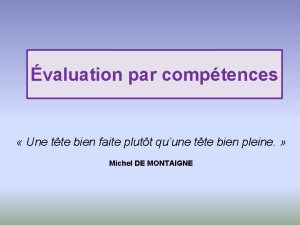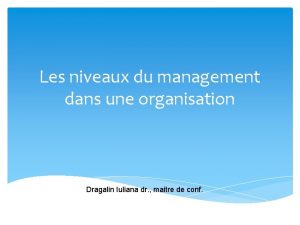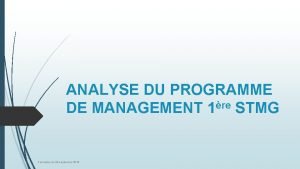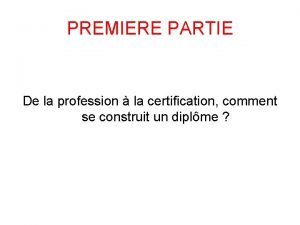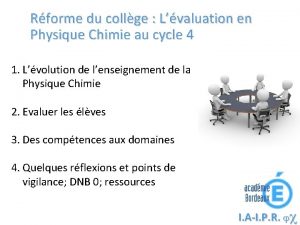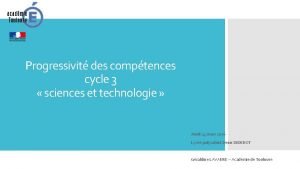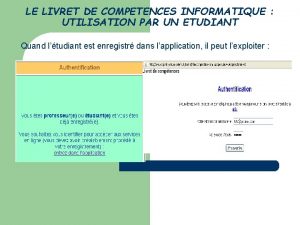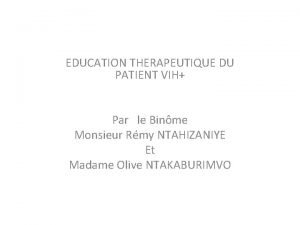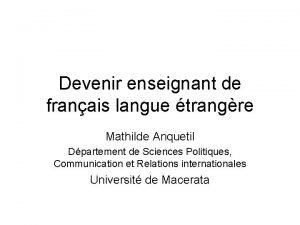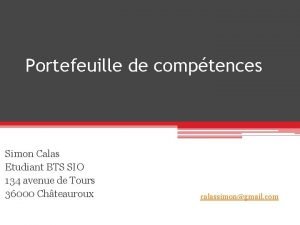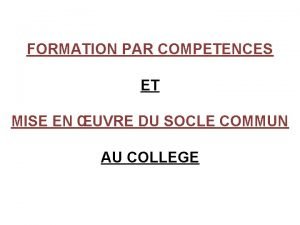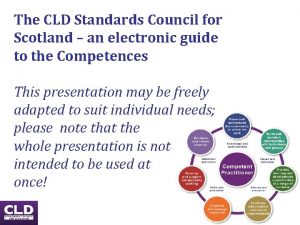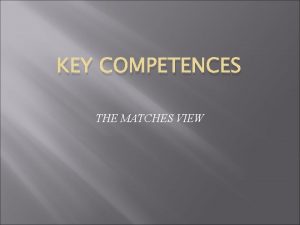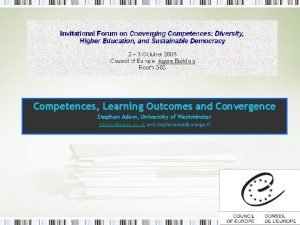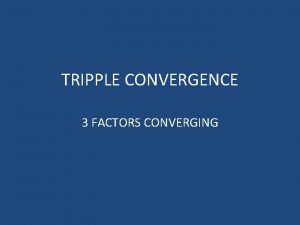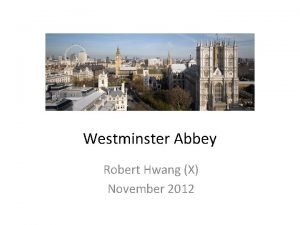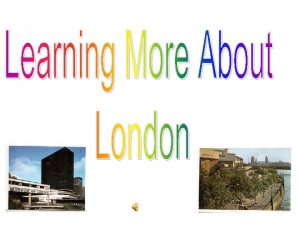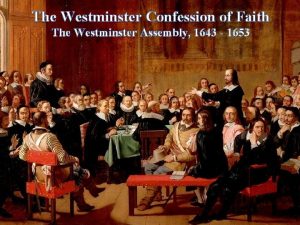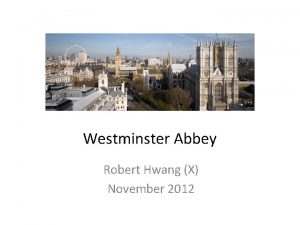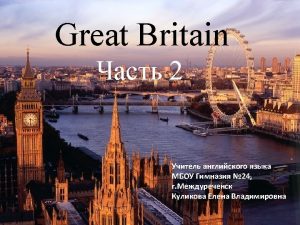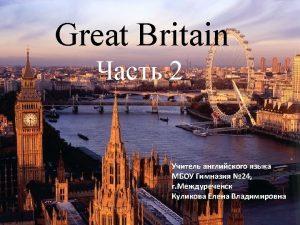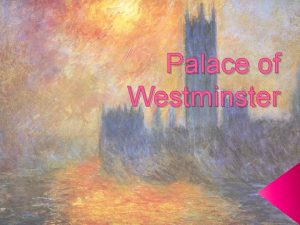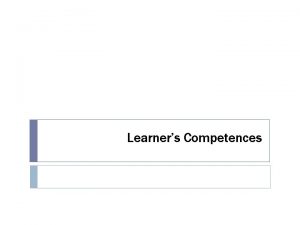Converging Competences Conclusions Stephen Adam University of Westminster















- Slides: 15

Converging Competences - Conclusions - Stephen Adam, University of Westminster adamss@wmin. ac. uk and stephenadam@orange. fr

QUOTE: from Radical Democracy: A Contested/ing Terrain by Kate Sandilands (York University, Toronto) Not that long ago, during a discussion of university teaching, a friend of mine posed an interesting question: "who, " he asked, "is your ideal student? " After some thought, I replied something like this: one who has understood the course materials in relation to her own experiences of the world; one who has considered the validity of these course materials, challenged them, and found them to be inadequate on their own; one who has formulated her own, independent analysis of the world and her own position within it, and has found that these, also, are not complete. Upon further reflection, I found that this "ideal student“ closely resembles my vision of an "ideal citizen" in a radical democracy. Substitute "common good" for "course materials" in the above description, and see what happens. To me, this similarity underscores the relationship between education and democracy. Not only should education (formal and informal) foster the types of awareness, empowerment, and participation that are crucial to active, democratic citizenship, but the processes of democracy themselves should be educative, dynamic, and ongoing. In this context, universities need to be both sites of education for democracy and sites, themselves, of democracy. http: //www. greens. org/s-r/05/05 -13. html

What have we learnt? Key points from presentations Why learning outcomes and competences are vital to the Bologna reform process? Explored the connection between learning outcomes/competences and the contribution of higher education to the broader political and societal agenda Identified some of the key generic competences that informed citizens should possess Begun to explore the convergence of the goals of higher education + its implications Identified practical ways in which HEI can promote these – via curricula and institutional reform The way forward – practical challenges to consider tomorrow and thereafter …?

Key points from presentations: Ding-Jo Currie President of Coastline Community College Georgia Nugent President of Kenyon College Zarko Nozica Pro-rector of the University of applied Sciences in Zagreb, EURASHE Ayne Hyland Former Vice-President of the Cork University College, EUA Jeanine Bruun European Students’ Union, ESU

Why learning outcomes and competences are vital to the Bologna reform process? LEARNING OUTCOMES: • as the basic building blocks of reform • impact on all aspects of Bologna reforms • have a major role in curriculum reform (cathartic process) • are a integral part of output-focused approach to teaching, learning and assessment • their use is intimately linked to the adoption of student-centred learning and the role of the teacher moves towards being a facilitator/manager of the learning process. • relate to all the external reference points (qualifications descriptors, level descriptors, subject benchmark statements) that constitute ‘new style’ qualification frameworks.

Towards a typology of learning outcomes - multiple applications



Explored the connection between learning outcomes and competences and the contribution of higher education to the broader political and societal agenda RAISES QUESTIONS ABOUT: • the purpose of higher education + whether these are changing as universities change (globalisation, competition, new technologies, etc. ) • what general transferable/transversal skills we should value? • • – Multidisciplinary core skills: to live in a complex fast changing society – Ability to listen, interact, communicate, be active and proactive – To understand other cultures and religions + be aware of our own cultural identity, etc. the who, what, why, where, how and when of education – the role of universities and colleges in the 21 st century the public responsibility for Higher education the role of the university as a site for democratic citizenship + what this means in practice higher education governance

Identified some of the key generic competences that informed citizens should possess COMPETENCES SHOULD INCLUDE: • helping to incorporate the principles of human rights, democracy, tolerance and mutual respect, the rule of law and peaceful resolution of conflicts into the daily practice of teaching and learning (Council of Europe website) • to protect human rights, pluralist democracy and the rule of law; • to promote awareness and encourage the development of Europe's cultural identity and diversity • to find common solutions to the challenges facing European society: such as discrimination against minorities, xenophobia, intolerance, bioethics and cloning, terrorism, trafficking in human beings, organised crime and corruption, cybercrime, violence against children; • to consolidate democratic stability in Europe by backing political, legislative and constitutional reform. (The current Co. E mandate 2005)

Begun to explore the convergence of the various goals of higher education + its implications ESTABLISHED THAT: • the individual goals should not be regarded in any sort of priority or competing way • the goals of higher education can mutually reinforce rather than contradict each other • the goals of higher education are interlinked and should not be seen as separate entities – the divisions between them are not clear cut • qualifications should be described in qualifications frameworks in such a way as to cover the full purposes of education

Identified practical ways in which HEI can promote these – via curricula and institutional reform INCLUDING: • reconsideration of the curricula • expressing the curricula in terms of learning outcomes – a cathartic process • introduction of learner/student-centred learning • re-examination of institutional structure and process – an evaluation of the level of transparency, democracy (governance) and representation (staff and student) within the institution • developing an appropriate, dynamic process of staff development and training • introducing more flexibility and choice in study programmes (credits)

Practical challenges - to consider tomorrow and thereafter… QUESTIONS: • The connection between the contribution of learning outcomes and competences (just tools) and the contribution of HE to the broader political and societal agenda – needs to move up the policy agenda as the role of universities is increasingly challenged – by diversity, economic pressures, marketisation, etc. How do we ignite the debate? • What is the role of these ’converging not competing competences’ in relation to questions about: who, what, why, where, how and when we educate citizens + the rights of all citizens? • How do these converging competences challenge our conception of the university and college in the 21 st century (including their structure, management and mission)? • Research is needed to see if any consensus can be built as to the nature of the most significant converging competences – can we identify them with more precision?

5. More thought is needed on the nature of these non-subject specific transversal/transferable skills - how they can be translated into practical reality (curriculum change) – they are not easy to write and even harder to translate into assessable practical activities? How can they be integrated with subject specific skills? 6. What are the implications of introducing these converging competences into the curriculum for teaching, learning and assessment? 7. How can we overcome prejudice against the introduction of what are sometimes described disparagingly as ‘soft skills’? 8. How can we prevent the potential dominance of the higher education landscape by employers’ market driven priorities? 9. How do converging competences impact on the notion of learner/student-centred learning? 10. What can be done to ensure that ‘converging competences’ are fully reflected in the newly developing national qualifications frameworks as well as the Bologna Framework for EHEA and the European Qualifications Framework (EQF)? These represent huge challenges + many difficulties …

Final thought: A pessimist sees the difficulty in every opportunity; an optimist sees the opportunity in every difficulty. Sir Winston Churchill (1874 - 1965)
 Modèle de grille d'évaluation des compétences
Modèle de grille d'évaluation des compétences Compétences conceptuelles du manager
Compétences conceptuelles du manager Processus ressources humaines exemple
Processus ressources humaines exemple Compétences vivre ensemble cycle 1
Compétences vivre ensemble cycle 1 Compétences distinctives stmg
Compétences distinctives stmg Référentiel compétences tisf
Référentiel compétences tisf Physique chimie
Physique chimie Compétences technologie cycle 3
Compétences technologie cycle 3 Compétences livret informatique
Compétences livret informatique Compétences d'adaptation éducation thérapeutique
Compétences d'adaptation éducation thérapeutique 8 key competences youthpass
8 key competences youthpass Référentiel de compétences enseignant pdf
Référentiel de compétences enseignant pdf Portefeuille de compétences bts sio
Portefeuille de compétences bts sio Scolatix
Scolatix Cld competences
Cld competences Key competences definition
Key competences definition
